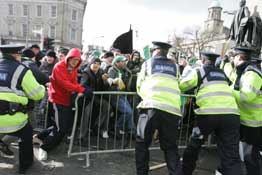9 March 2006 Edition
Letters to the Editor

The Dublin riot
A chara,
Michael McDowell has seriously insulted Irish nationalists with his alignment to the Love Ulster Campaign and those who oppressed the nationalist community in the Six Counties. The Love Ulster Campaign and its glorification of British Army, RUC and UDR personnel, is a political group that seeks to undermine Irish nationalism and justify Crown Forces who have brutally killed in the name of Unionism.
It is well for them to state that members of the RUC, British Army and UDR are victims of IRA killings, but it must also be pointed out that the ethos behind the British Army, RUC and UDR in Ireland, is one of terrorism and criminality.
We only need to open the files on the Bloody Sunday killings or the collusion between the RUC/UDR and loyalist Death Squads; or the systematic repression of nationalists, since the foundation of the Northern state. Not to mention the British Army involvement in the Dublin and Monaghan bombings. There is also the question of the serial-killer Robert McConnell, a member of the UDR and UVF, and his involvement in the murder of over 45 Catholics. Is Michael McDowell a supporter of Robert McConnell? Does he support all the actions of the British Army, RUC and UDR?
Before any Sectarian Orange Order or loyalist band is invited back to the streets of the Dublin City, Michael McDowell must first explain his position on those who have murdered and killed in the name of Ulster Unionism.
Is Mise,
Tomas mac Cormaic
Dál Cormaic Luisc, Clochrua, Contae Chorcaí
A chara,
In my opinion, the riot which took place in our capital city provided a much needed slap in the face. Yes, there was a political context which has subsequently been over exploited and purposefully misinterpreted by the great and the good. This was a means of condemning those who objected to the parade of individuals who have in the recent past, not been adverse to throwing bags of urine at the children of Holy Cross national school.
The riot was a display of class conflict. Who took part? Children, youths, young men who have been abandoned by a society that does not even consider them, but perceives and conveniently labels them as the underbelly, the underclass. They have been marginalized, subjected to generational unemployment, discrimination, inadequate housing and education, drugs, crime, all of which are the norm of their daily lives. In other words poverty, which is the most extreme violence of all. They gave vent to their anger and frustration at being left behind. They reclaimed their city.
The so called middle classes (aspirational and otherwise) looked on in horror, gasping at the inconvenience being meted out to them, as they could not engage in their favourite past time of copious consumption and rendering themselves in to deeper levels of debt.
Who did they attack? The police- a force which has been a continuous negative presence within the lives of those who rioted.
Do I blame them? No. In the opinion of many, they are thugs, mindless hooligans who engaged in wanton violence. To the many I say, if these young men are to be identified as such, then we as a selfish, self absorbed, equally mindless society created them. It is not their fault. It is ours.
Is mise,
Grace O'Reilly B.A., M.Soc.Sci.
North Strand, Dublin 3.
Remember the Hunger Strikers
A chara,
Twenty five years ago on 1 March 1981 Vol Bobby Sands began to refuse food in protest at attempts by Margaret Thatcher and the British government to criminalise the republican struggle.
To mark this event Ógra Shinn Féin Dkit (Dundalk Institute of Technology) held a day long Exhibition in the college. It was very well attended and there was great interest in the exhibition amongst the students, most of whom were too young to remember the events of 1981 or, in some cases like my own, were not even born. There was a book of condolence signed by a number of students in memory of the hunger strikers.
Those involved in the Hunger Strikes of 1980 and 1981 were ordinary men and women who in extraordinary circumstances and with the support of people throughout Ireland, defeated this policy.
Before the Hunger Strike was to end in October 1981, ten young Irishmen were to die in defence of the principle that theirs was a political struggle and that, like Terence MacSwiney before them, they would not be criminalised. During that momentous year, the Irish people elected Bobby Sands MP for Fermanagh/ South Tyrone and the people of Cavan/Monaghan elected Kierán Doherty TD.
The legacy of the 1981 Hunger Strikes is still unfolding, but the aims for which these young men gave their lives are still being fought for today. The struggle for a republic based on the principles of the 1916 Proclamation continues and the sacrifice made by past generations will not be forgotten.
Is Mise,
Eugene Garvey,
Dundalk.
